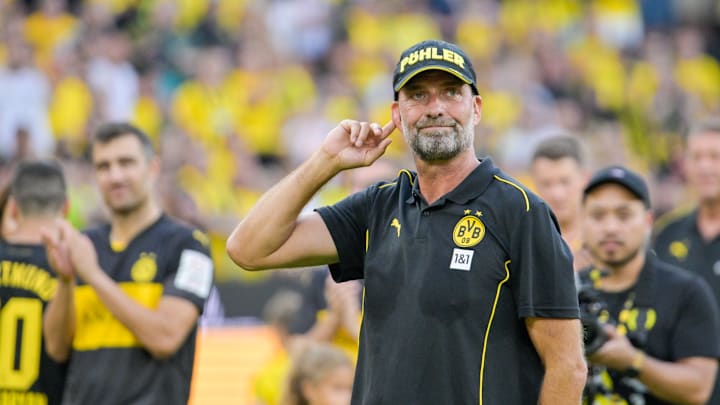For many Borussia Dortmund fans, Jürgen Klopp is almost seen as a mythical hero of a bygone era for the club, with his tenure at the helm being the most successful era in the club’s modern age. Having led the club to two Bundesliga titles, a DFB Pokal and a Champions League final, Klopp cemented his place as one of the best coaches the club has ever had.
On top of his sporting success, his personality and general ethos have not only completely resonated with the club; they have become the template Dortmund (rightfully or wrongfully) has tried to use when seeking out new coaches ever since he left for Liverpool. The club’s obsession to find the next Klopp shows just how much his and the club’s football DNA are intertwined.
Klopp's recent actions this week have, at least from an ideological standpoint, deviated from the man that Dortmund, and even Liverpool fans were used to as it was announced that Klopp was set to return to football with the Red Bull organization as head of football operations. This decision has drawn the ire of fans, namely Dortmund fans as well as fans across Germany, who from the standpoint of German football’s core values and socio-political landscape see this as a benevolent figure joining what many see as an “evil empire” in the football landscape.
This sudden shock to the system that Klopp's decision has triggered is not surprising, considering the divisive position Red Bull holds within German football. RB Leipzig's rise has been seen as "unnatural" by Bundesliga traditionalists, and having a figure such as Klopp with his strong links to German football and the almost ambassadorial role he has played for it join the organization is not exactly what most would have pinned as his next career move.
On the other hand, the move doesn't come as a complete shock considering how for former Dortmund and Liverpool coach has spoken about Red Bull in the past. In a previous interview with the DFL, Klopp lauded the Red Bull model and even went on to say that they "haven't taken anything away from traditional clubs".
Of course, some would be quick to disagree with Klopp as there are very clear misgivings about whether RB Leipzig fits in the parameters of 50+1. With this very debatable fact in mind, Leipzig's rather contested status in German football is anything but traditional by Bundesliga standards.
As for Klopp's move to Red Bull, there are other factors that could have led to the job being far more tempting for him. The number of people who have been associated with Klopp who work for Red Bull, for example (Marco Rose, Pepijn Lijnders, etc) could have played a role in this vein. Red Bull also has a focus on youth players, something that we’ve known Klopp (especially when he was in Germany with Dortmund) to focus on, and being able to support Sporting Directors of numerous clubs to help facilitate additional development sounds right up his alley, especially after Klopp expressing his desire to step away from the sidelines.
Despite the outrage that Klopp's move has triggered, it can only be seen as a very good from an RB perspective; a complete PR master stroke. As an established figure in the football world, Klopp brings further legitimacy to the organization and its continued projects.
Klopp's decision is one of a slew that has been slowly altering the landscape of German football. It would be remiss not to point out that decisions made by clubs that aren’t named Leipzig or that fall under the Red Bull umbrella have also deviated from core values that have defined Bundesliga clubs for decades. Taking Dortmund as an example, the deal with Rheinmetall was and is (rightfully) heavily criticized as a heavy deviation from what one would expect in terms of club sponsorship dealings. The only assumption one can glean from this is that German football is changing on the professional end of things, with the lines of what is traditional and acceptable more blurred than ever. Klopp’s decision, while clearly taboo, is less of a cardinal sin in my eyes than partnering with an arms manufacturer.
The reasoning for Klopp’s decision making however is less important than the final takeaway, which is that German football is indeed undergoing changes; changes that reflect a shift in perspective, at least on the business side of things. Be it the rise of club consortiums under the stewardship of one organization, or the acceptance of more than questionable sponsorship deals, these events are indicators (to a vastly varying degree) that the football landscape is morphing, and the gulf between the perspectives of those with power and fans only grows larger as a result.
